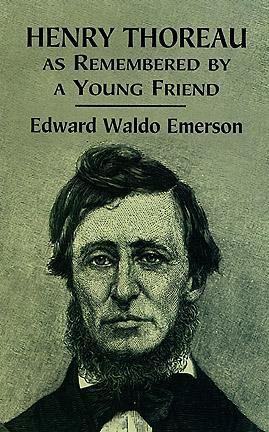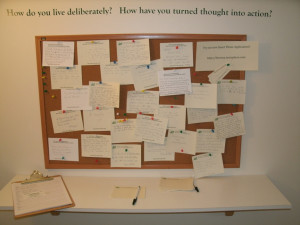The following is Lucille Stott’s original letter to the editor, an edited version of which was published in this week’s New Yorker, the 11/9/15 issue. Lucille is a charter board member emerita and former president of The Thoreau Farm Trust.
“In attempting to offer a provocative rereading of Henry David Thoreau’s life and work, Kathryn Schulz has instead succumbed to hackneyed stereotypes and common wisdom. A closer, more sensitive reading reveals a complex man deeply connected to family and community; an eccentric, to be sure, but a passionate man of genius, without doubt.
One of the lesser-known realities of Thoreau’s life was his warm relationship with the children of Concord, who gathered around him in his prime and brought him gifts on his deathbed. Edward Emerson, the son of Ralph Waldo, became concerned by the misconceptions that surrounded his friend, the kind that Schulz perpetuates in her unfortunately titled essay. He might have been writing directly to her when, in his 1917 book, Henry Thoreau: As Remembered by a Young Friend, he calls Henry “the best kind of an older brother.”
Emerson says he felt compelled to write about Thoreau “because I was troubled at the want of knowledge and understanding, both in Concord and among his readers at large, not only of his character, but of the events of his life—which he did not tell to everybody–and by the false impressions given by accredited writers who really knew him hardly at all. When I undertook to defend my friend, I saw that I must at once improve my advantage of being acquainted, as a country doctor, with many persons who would never put pen to a line, but knew much about him — humble persons whom the literary men would never find out, like those who helped in the pencil mill, or in a survey, or families whom he came to know well and value in his walking over every square rod of Concord, or one of the brave and humane managers of the Underground Railroad, of which Thoreau was an operative. Also I had the good fortune to meet or correspond with six of the pupils of Thoreau and his brother John, all of whom bore witness to the very remarkable and interesting character of the teachers and their school…. I wish to show that Thoreau, though brusque on occasions, was refined, courteous, kind and humane; that he had a religion and lived up to it.”
Schulz has done us something of a service, I suppose, in demonstrating that the transitory buzz of “gotcha” criticism can never erode the lasting pleasure and value of deep, contextual reading.”
Here’s the link to all 5 of the letters to the editor; Lucille’s letter is the 5th: http://www.newyorker.com/magazine/2015/11/09/the-mail-from-the-november-9-2015-issue




